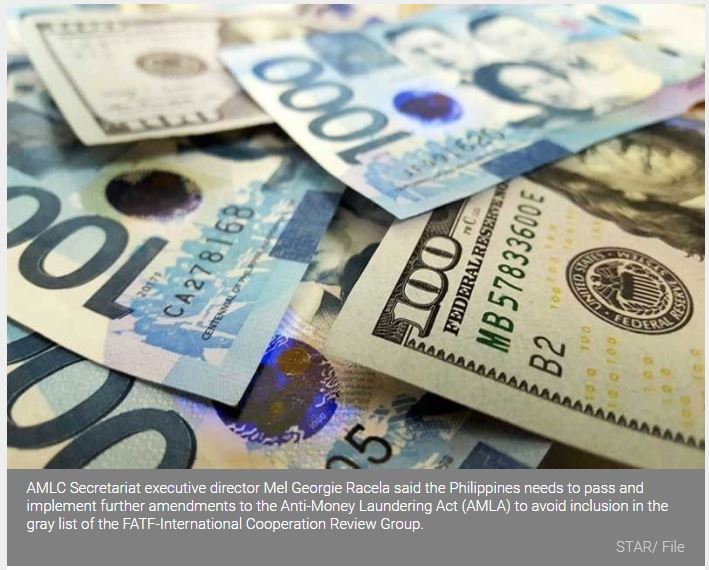Philippines faces FATF sanctions
MANILA, Philippines — The Philippines is in danger of being included anew in the gray list of Paris-based dirty money watchdog Financial Action Task Force (FATF) if the country fails to pass the necessary amendments to the anti-money laundering law, according to the Anti-Money Laundering Council (AMLC).
AMLC Secretariat executive director Mel Georgie Racela said the Philippines needs to pass and implement further amendments to the Anti-Money Laundering Act (AMLA) to avoid inclusion in the gray list of the FATF-International Cooperation Review Group.
Proposed amendments to the law include the inclusion of tax crimes as predicate crimes to money laundering, as well as the inclusion of real estate developers and brokers who engage in buying and selling of real properties.
The changes also aim to further strengthen the AMLC by granting it subpoena and contempt powers.
“Failure to pass and to implement the amendments to the AMLA, as amended, before February 2021 will have similar effects – that is the Philippines’ inclusion in the FATF-ICRG gray list,” Racela said.
He pointed out the Philippines has four months left to pass and implement the proposed amendments to the AMLA.
The STAR earlier reported that the Philippines’ observation period has been extended to February 2021 due to the COVID-19 pandemic. The AMLC is required to submit a comprehensive report on the progress in implementing the recommended actions after a review in April.
The FATF will decide in June instead of February 2021 whether or not the Philippines will be included in the watchdog’s gray list.
“We are at the last stretch of the 16-month observation period. I just wanted to highlight that it is not enough that we pass the law, we also need to demonstrate effective implementation. I hope that with the information campaign that we have been implementing, this information would reach the proper authorities and would support the amendments to the AMLA,” he said.
Racela said the inclusion in the gray list would publicly identify the Philippines and its citizens as a risk to international financial system for having strategic deficiencies in anti-money laundering/combating the financing of terrorism framework.
“Consequently, the Philippines’ inclusion will result in an additional layer of scrutiny from regulators and financial institutions, thereby increasing the cost of doing business with Filipinos, delay the processing of transactions and blocking the country’s road to an A credit rating,” he said.
Racela also said the recent passage of Republic Act 11479 or the Anti-Terrorism Act (ATA) of 2020 is not enough for the Philippines to avoid the re-inclusion in the gray list of the FATF.
“Although the passage of the ATA is a welcome development, this is not enough as the Philippines is being assessed both on technical and effectiveness compliance,” he said.
Accoridng to Racela, the country must also demonstrate effective implementation of the ATA before the observation period ends in February.
The Philippines was blacklisted by the FATF in 2000 for failing to address “dirty” money issues, paving the way for the enactment of RA 9160 or AMLA in 2001. It was subsequently removed from the blacklist in February 2005.
The Philippines narrowly avoided being placed on blacklist in 2012 as it criminalized terrorist financing and pursued quicker freezing of suspect accounts.
Source: https://www.philstar.com/business/2020/09/14/2042183/philippines-faces-fatf-sanctions


 English
English




